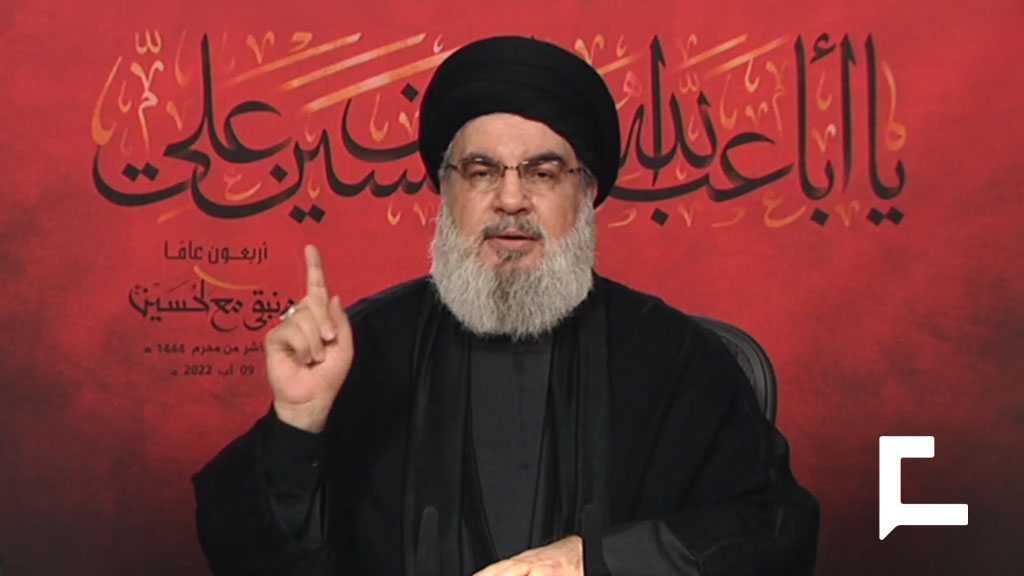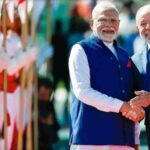
The State of Israel began a war against the Gaza Strip that has already left more than 9,000 Palestinians dead. Since October 8, clashes on the southern Lebanese border have not stopped between Hezbollah and Israel, and have already left 56 members of the Lebanese organization dead. This Friday, November 3, and after 28 days of silence, the Secretary General of Hezbollah, Hassan Nasrallah, finally spoke.
Never has a speech by the secretary general of that organization kept so many people in suspense, even beyond the borders of Lebanon, while the Lebanese organization is today identified as one of the main factors of the Israeli escalation in Gaza and an expansion of the conflict to other countries, a scenario that the West and Israel absolutely try to avoid. In a long speech broadcast in several cities across the country, Nasrallah did not, however, announce an acceleration of the war. On the other hand, he sought to present himself as an alternative to the Arab bourgeoisies that are conspicuous by their absence or their collaboration with Israel, avoiding moving towards direct confrontation.
Between supporting Hamas and clarifying Iran, Nasrallah seeks to measure his speech
Hassan Nasrallah claimed that the Al-Qassam Brigades attack was 100% Palestinian and insisted that the clandestine nature of this operation had been essential to preserve the Palestinian identity of this battle, although Hamas allies – and in particular Iran – did not They were aware. In other words, if Iran currently supports Hamas, it does not wish to become directly involved in this conflict.
A “precision” that also makes it possible to minimize the responsibility of Iran, which wants to avoid a conflict due to its own contradictions, while celebrating the success of the operation. The Hezbollah leader presented himself as a leader of an axis against Israel, formed in particular by Hamas and the Yemeni Houthis, and whose leadership the Lebanese organization should assume without direct intervention (for the moment) from Iran.
Although today Hezbollah is considered the only force in the Arab world that openly and unconditionally supports Hamas and does not hesitate to denounce the silence of the Arab countries, it is also the only organization that today maintains a confrontation, even of low intensity, with the IDF, outside of Palestinian political groups. The challenges of this first public discourse were, therefore, multiple.
In fact, Hezbollah first had to reassure a part of Lebanese society and its detractors, who accuse it of putting the security of the entire country at risk in a war with Israel. Another challenge for Hezbollah is to remain the main opposition organization to Israel in the country, while moderating the solidarity with the Palestinian people that exists today in important sectors of its base and the Lebanese youth, who hope that Hezbollah will enter a tougher confrontation with Israel. .
To engage with this base, Nasrallah highlighted the strategic role of the Lebanese Front in the Gaza war and stated that Lebanon had already entered a state of war since October 8, and that the strategic importance of the current clashes should not be underestimated. , although they remain, in their own words, “insufficient.” The Hezbollah leader further highlighted that the mobilization of Israeli air, sea and land forces towards Israel’s northern front had helped relieve pressure on Gaza, considering this a war gain for the Palestinians. A statement that seems disconnected from reality, at a time when the situation in Gaza is catastrophic and genocidal.
From this point of view, if the contours and political perspectives of the Israeli ground invasion remain unclear, these contradictions are due to the risk of military escalation with other actors, in particular in southern Lebanon with Hezbollah, but also due to the deepening of the internal contradictions of the State of Israel and the fact that the United States is trying to avoid a major conflagration in the Middle East. These crucial factors were largely ignored by Nasrallah, who instead emphasized the value of the ongoing clashes on Israel’s northern border as a major component that would relieve pressure on Gaza. However, this concern of Israel that must dedicate part of its attention to its northern border is totally relative, while Gaza has already been transformed into a collective grave, with an Israeli offensive entering its third phase.
In reality, Hezbollah’s current situation is complex. While Nasrallah attempted to learn lessons from the Gaza war based on the 2006 experience, Hezbollah’s current position differs significantly, whether at the national or regional level. Certainly, Hezbollah has established itself as the main Lebanese political organization to oppose Israel and the only one to question the silence of the Arab world, the Abraham Accords and the colonial policies of the imperialist powers.
A position that Nasrallah did not fail to recall in his speech, evoking the Sykes-Picot agreements to underline Israel’s role as an instrument of the West to protect its interests, and warning that the United States could always use the Israelis to pursue its colonial objectives. However, this opposition to Western countries and its denunciation of American responsibility for Israel’s impunity as well as its discourse of support for the Palestinian cause goes against the attitude and regional and internal policies in Lebanon that Hezbollah has led. in recent years.
Hezbollah presents itself as an alternative, but its support for Palestine is subordinated to its own interests
Since joining the Lebanese government in 2008, Hezbollah’s relationship with its base has evolved, as the organization has become a true arbiter of the Lebanese political system. Its image has gone from that of a resistance party fighting against Israeli colonialism to that of a political party with an internal theocratic project and a regional strategy aligned with the Iranian agenda, relegating the Palestinian issue to the background of its priorities. This crisis of legitimacy has intensified, particularly due to its involvement in the Syrian war as a fundamental pillar of the counterrevolution of the Syrian leader, Bashar Al Assad, and an actor in the repression of what had been one of the most massive movements in of the Arab Spring.
Within Lebanon itself, Hezbollah betrayed part of its base, following the vast demonstrations of 2019, during which it played a leading role in nipping in the bud the nascent uprising against the Lebanese regime of which it became a centerpiece and key factor. of stability. Much more so since the popular uprising of 2019 exacerbated the government’s legitimacy crisis and radicalized and politicized the Lebanese population in relation to problems linked to class politics imposed by the oligarchy and covered up by the confessional regime. Contradictions that could worsen as the explosion in the port of Beirut on August 4, 2020 and the continued deterioration of the economic situation continue to plunge the Lebanese, Syrian and Palestinian populations living in the country into increasingly precarious conditions.
The current situation in Gaza poses a new challenge to that population that feels powerless in the face of events and confirms the abandonment of the Palestinian cause by the Arab countries, as well as the alignment of Hezbollah with the regional agenda of the Iranian bourgeoisie, which repressed popular uprisings after the assassination of Gina Amini. If Hezbollah cannot foresee the complete destruction of a now central ally like Hamas, the organization’s contradictions are multiple, between its alignment with Iranian policy and its internal interests within the Lebanese regime.
The liberation of the Arab working class is closely linked to the end of Israeli colonization, as well as the fall of bourgeois and dictatorial regimes such as that of Bashar al-Assad in Syria or Abdel Fattah al-Sisi in Egypt. The Arab population faces an immense challenge, fighting against its own bourgeoisie as well as against the colonial policies of imperialism and Israel.
Hezbollah’s active role in crushing the Syrian revolt and pacifying the Lebanese streets goes completely against the active intervention of the Arab masses and the working classes who are today the best allies of the Palestinian people against the attacks of Israel, supported by the powers Westerners and the complicity of the Arab bourgeoisies of the region. During the Arab Spring, it was the Egyptian masses who obtained the reopening of the border that separates the country from the Gaza Strip, before its crushing by the counterrevolution led by Al-Sisi and Western countries. It was also at this moment when the mobilizations throughout the region made it possible to denounce the successive normalization policies of the Arab countries that today play a criminal role, either due to their silence or their collaboration with Israel.
Source: www.laizquierdadiario.com

